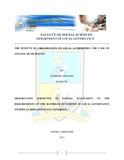Please use this identifier to cite or link to this item:
https://cris.library.msu.ac.zw//handle/11408/3102Full metadata record
| DC Field | Value | Language |
|---|---|---|
| dc.contributor.author | Sibanda, Comfort | - |
| dc.date.accessioned | 2018-08-28T14:18:22Z | - |
| dc.date.available | 2018-08-28T14:18:22Z | - |
| dc.date.issued | 2017 | - |
| dc.identifier.uri | http://hdl.handle.net/11408/3102 | - |
| dc.description.abstract | Urbanization is gradually having an influence on urban centers. It can be defined as the growth of towns and cities in terms of services and infrastructure with rural to urban migration being its major characteristic. The developing world has over the years seen most of its population migrating into the so called bright towns and cities that have a potential of providing better services and an upgrade of an individual’s standard of living compared to remote areas. The rapid rural to urban migration has greatly affected local authorities the most as they are the hosts and have to provide efficient and effective service delivery to the people at all cost. Corruption, residents not being faithful in their monthly payments, over population per density area, shortage of capital and resources, shortage of skilled minds in Council that are proactive in nature as well as dilapidated structures which are no longer efficient in handling the human daily activities have weakened the hosting local authorities day by day and its potential to meet the needs of the growing population. The research aims to bring out the effects of urbanization on local authorities covering both its merits and demerits. Some merits are that there is creation of vast job opportunities, infrastructural development, business boom, new skills drawn into the local area, availability of cheap labor and opportunities of an entrepreneurial environment. The other side of urbanization being the crawling in of illegal vendors; growth of the informal sector, informal settlements are likely to erupt as the population would later exceed the number of stands available, increase in crime rate and over population. The research also noted other scholarly work to support the study. The research findings highlighted that most people migrated due to rural poverty and the need of a better standard of living. The research went further to recommend that there should be stakeholder involvement and alignment of all tires of government and ministries for easy access of resource and knowledge sharing. Urbanization is a real threat and if not well addressed local authorities may find themselves few years down the line struggling to survive in this dynamic environment. | en_US |
| dc.language.iso | en | en_US |
| dc.publisher | Midlands State University | en_US |
| dc.subject | Urbanisation | en_US |
| dc.subject | Urban centers | en_US |
| dc.subject | Rural to urban migration | en_US |
| dc.title | The effects of urbanization on local authorities: the case of Gwanda Municipality | en_US |
| item.grantfulltext | open | - |
| item.fulltext | With Fulltext | - |
| item.languageiso639-1 | en | - |
| Appears in Collections: | Bsc Local Governance Studies Honours Degree | |
Files in This Item:
| File | Description | Size | Format | |
|---|---|---|---|---|
| r143617w.pdf | Full Text | 1.09 MB | Adobe PDF |  View/Open |
Page view(s)
168
checked on Feb 14, 2026
Download(s)
138
checked on Feb 14, 2026
Google ScholarTM
Check
Items in MSUIR are protected by copyright, with all rights reserved, unless otherwise indicated.



